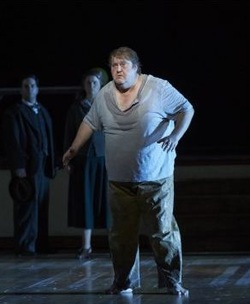 Anthony Dean Griffey in the COC's Peter Grimes.
Anthony Dean Griffey in the COC's Peter Grimes. For a couple of days, word on the street was that Ben Heppner probably wouldn’t be appearing on the opening night of the Canadian Opera Company’s Peter Grimes. So the official announcement that the 57-year old singer “remains indisposed” came as no great surprise to the audience at Toronto’s Four Seasons Centre on Oct. 5. Nevertheless, the statement was greeted with a collective sigh from an audience eager to hear Toronto’s star heldentenor in a rare hometown appearance.
From his first notes, Griffey’s delivery was clear, strong, and secure. And as the evening progressed, he found ways, both vocally and dramatically, to explore every corner of the tragic fisherman’s complex character: his obsessive energy, his naiveté, his bitterness, his brutality, and his increasingly tenuous grip on reality. Griffey’s intricate, decisive portrayal of the title role was like a beam of sunlight, cutting through the cloud of disappointment that hung over the evening.
With the support of a uniformly strong collection of singers, Griffey’s Grimes was a first among equals. Throughout, vocal styles were kept simple and direct, diction was clear, and nobody showed any inclination to sing for singing’s sake. As well, the whole cast supported the dramatic thrust of the piece, fully inhabiting a gritty tale of alienation in a bleak English fishing town. Together, they overcame all obstacles in their path. (More on that below.)
Opposite Grimes, as Ellen Orford, soprano Ileana Montalbetti faced the challenge of a role somewhat older than her thirty-ish years. Her approach was often understated – yet beneath her modest, schoolmarmish portrayal, there was a deep mine of emotion. And vocally, her upper range had just enough edge to bring intensity to her character when needed.
Among the supporting male roles, Alan Held, as Captain Balstrode, stood out. His hefty bass-baritone and daunting persona proved an effective counterweight to the headstrong Grimes. Also impressive were baritone Peter Barrett as the apothecary Ned Keene, and bass Robert Pomakov as the carter Hobson.
As for the women, mezzo-soprano Jill Grove’s Auntie (the pub owner) was appropriately unrefined. And mezzo-soprano Judith Christin turned her Mrs. Sedley into a salacious Miss Marple, relishing crime and death.
Now for those obstacles. Principally, they lay in the single-piece set that the COC saddled itself with (a co-production of Opera Australia, the West Australia Opera, and the Houston Grand Opera). The joint decision of director Neil Armfield and set designer Ralph Meyers to locate the whole opera inside a small-town community hall made for a fine metaphor: Peter Grimes is very much about the power of community, whether benign or harmful. Unfortunately, the idea didn’t translate very well in practical, nuts-and-bolts terms.
The absence of scene-changes rendered Britten’s “sea interludes” – masterfully performed by the COC Orchestra under music director Johannes Debus – theatrically pointless. And sometimes the stage action descended into the ridiculous, as when Grimes dragged his boat right through the community hall. Furthermore, the decision to have the non-singing Dr. Crabbe (played by Thomas Hauff) constantly wandering around the stage achieved no apparent effect, other than occupying space and time.
For the record, this critic is no “operatic fundamentalist,” opposed to directorial re-interpretations per se. But they aren’t always successful – and this was one of those sad occasions when success proved elusive.
The COC’s Peter Grimes dodged a bullet on opening night, thanks to the convenient availability of Griffey. The whole cast, chorus, and orchestra contributed a musically satisfying evening. But the structural weaknesses of this production were a problem that the company should have spotted a nautical mile away.
© Colin Eatock 2013
 RSS Feed
RSS Feed

